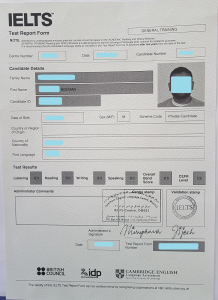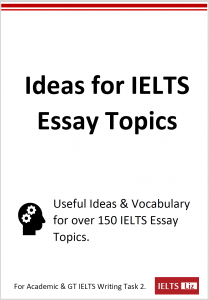IELTS can be emotional for many people for various reasons. In this post, I want to discuss why emotions can bubble over before and during the IELTS test.
The reason I am writing this test to to reassure students that it is normal for emotions to run high in the test. Below are three common problems with emotions and crying in the IELTS test.
1) IELTS is Important for your Future
For many students, the IELTS test is the key to their future. Without a good score, many students are unable to take the next step towards creating a better life for themselves. For this reason, emotions can run high when it comes to IELTS.
However, you should not tackle IELTS with emotions. This is a specific language test with specific rules and specific requirements. You need to tackle IELTS logically and calmly. You must ensure you are fully prepared before you walk into the exam room.
Here are some steps to prepare for IELTS:
- Have a realistic goal. Don’t aim for band 7 if your English contains so many mistakes.
- Learn as much as you can about the test. What can take into the test room? How does the examiner mark writing task 1? Learn as much as you can:
- Practice each type of question for L, R, W & Sp.
- Review model answers for IELTS speaking and writing .
- Prepare common topics for speaking and writing.
- Watch my free video: How to Prepare for IELTS (click to open)
- Don’t keep taking the test again and again. Review your techniques, review your English and work on your weaknesses before taking the test again. Make sure the next time you take the test, you have improved.
Quote Einstein: “Insanity: doing the same thing over and over again and expecting different results.”
2) Crying in the Speaking Test
I have known students cry in their IELTS speaking test. The most common reason is that they start talking about painful memories which upset them.
This is a language test and a chance to showcase your English. You must think in this way when you enter the test room. All students will be nervous in the test and also emotional to some extent. Students feel pressure to perform and feel the pressure to get good results. This can make you emotional.
In part 2, if the question is about a person you admire, don’t choose to talk about someone who recently died and who you loved. It will distract you from thinking about your English and bring up painful emotions. If you cry in the IELTS test, the examiner CANNOT give you more time. So, be wise in your choices and choose to talk about someone else. Avoid talking about sad memories or difficult personal issues.
If you get emotional in the test, take a deep breathe and hear my words “This is your test! Take control of your test! Take control of your future! Say to the examiner “I’m ready to continue” and then focus on the question – you can do it !!!” I want you to hear my voice, relax and ace your test! My best wishes will always be with you.
3) Problems in L, R, & W
The most common problem in the IELTS listening test is losing your place. This is because students try to understand everything rather than listen for answers and follow key words.
In IELTS reading, I have heard of students crying because they didn’t write their answers directly on the answer sheet. You DO NOT get an extra 10 mins to transfer your answers.
In IELTS writing, the most common reason students get upset is because they didn’t mange their time and failed to complete both tasks. There is a clock in the room and you should keep checking the time. The examiner DOES NOT tell you when to move from task 1 to task 2. You must manage your time for both tasks in the hour provided.
Share your Experiences
Feel free to write a comment and share your experiences of the IELTS test with other students.
Thanks, Liz
Summing Up Emotions
- Be realistic about your expectations in IELTS. If your English is only intermediate level, don’t expect to get band score 7 or 8. This is a language test, tips will only take you to your own personal maximum – not above.
- Don’t get over tired. Pace yourself, schedule your practise.
- Before the speaking test, get plenty of rest.
- In the speaking test, don’t talk about emotional issues or sad memories. This is a language test, make the right decisions so that you can showcase your English.
- The examiner can’t give you extra time if you cry in the speaking test. Try to calm down and focus on the next question. Say to the examiner “I’m fine to continue” or “Sorry, I can continue now.”
- In LR&W, go to the toilet before the test – you will miss answers and lose time if you go to the toilet during the test.
- In the listening test, pay attention to key words and be ready to move to the next question so you don’t lose your place. Always check if there are questions on the next page.
- In reading, don’t forget you DON’T get extra time to transfer your answers!! Don’t forget this!
- In writing, keep your eye on the clock! Don’t spend more than 20 mins in task 1 and don’t spend more than 40 mins on task 2. Always write an overview for task 1 and a conclusion for task 2.






